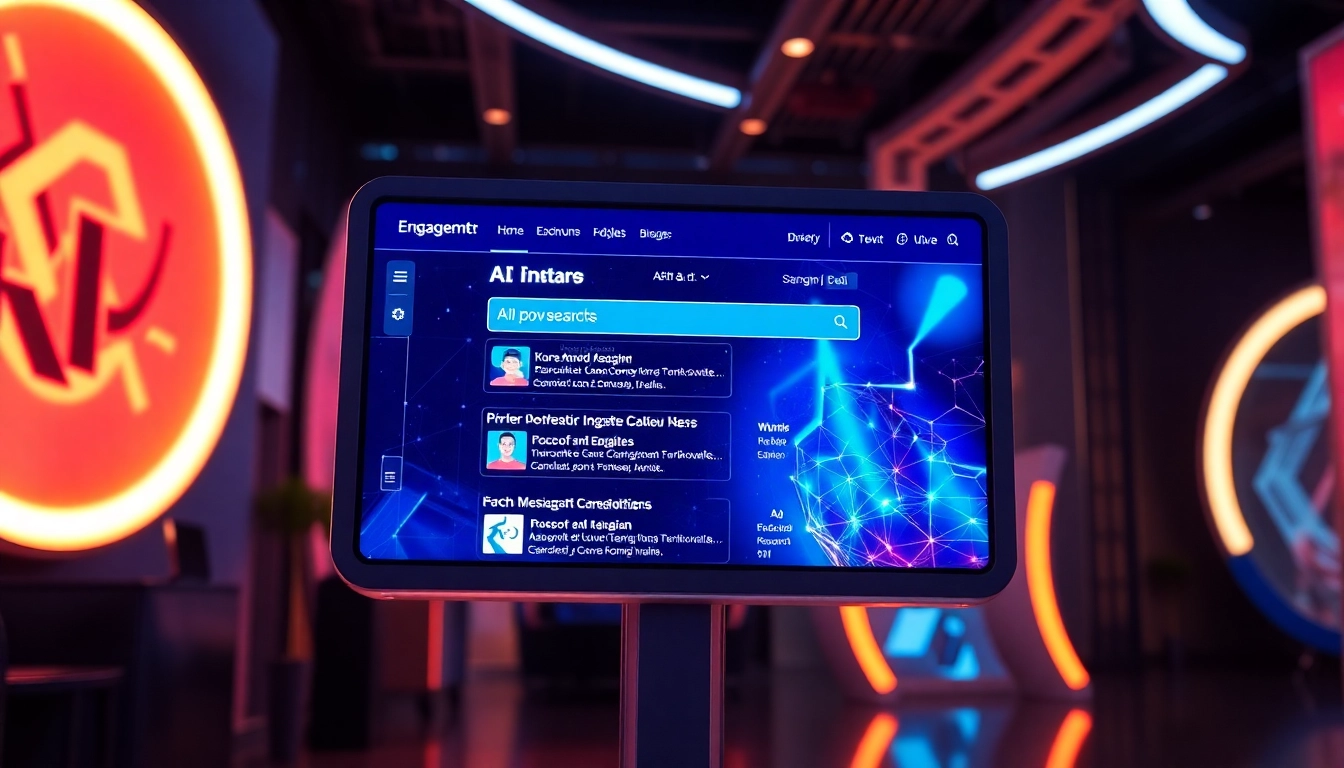
Understanding AI Powered Search
In recent years, the emergence of AI powered search capabilities has transformed how individuals interact with information online. In contrast to traditional search engines, AI-powered search systems utilize sophisticated algorithms and vast amounts of data to deliver more accurate, relevant results. This transformation not only enhances the user experience but also drives effective decision-making for businesses. As technology continues to advance, understanding AI powered search’s intricacies is essential for both developers and end-users.
What is AI Powered Search?
AI powered search refers to search technologies that integrate artificial intelligence (AI) to provide enhanced search capabilities. Unlike conventional search systems that rely heavily on keyword matching, AI powered search employs various techniques such as natural language processing (NLP), machine learning, and data learning to understand user intent and deliver tailored results. By analyzing user queries and context, these systems can refine their responses and adapt based on user interactions, ultimately improving search experiences over time.
How AI Enhances Search Functionality
The integration of AI into search functionality manifests in several ways:
- Natural Language Understanding: AI systems can decode the nuances of human language, deciphering intent and context, allowing users to ask questions in a more conversational manner.
- Personalization: By leveraging user data and behavior, AI powered search can personalize results, offering relevant recommendations based on individual preferences.
- Adaptive Learning: As users engage with search results, AI algorithms learn from this feedback, continuously improving the search experience through machine learning techniques.
- Multimodal Search: AI enables the integration of various data types, such as text, images, and voice commands, broadening the search capabilities onto different platforms, including visual and voice-activated searches.
- Contextual Awareness: AI powered search systems are designed to consider the context of queries (such as location, time, or past interactions), delivering results that are not just accurate but contextually relevant.
Benefits of Implementing AI in Search
Implementing AI in search technology offers businesses and users several notable benefits:
- Increased Accuracy: AI powered search yields highly relevant results, reducing the amount of time users spend sifting through irrelevant information.
- Enhanced Efficiency: By anticipating user needs and preferences, AI can streamline the search process, allowing users to find what they’re looking for more quickly.
- Improved User Engagement: Personalized experiences can lead to higher user satisfaction, increasing engagement rates and encouraging repeat interactions.
- Reduction in Bounce Rates: When users receive more accurate results tailored to their needs, the likelihood of leaving a site without exploring is significantly diminished.
- Data-Driven Insights: Businesses can gather and analyze user behavior data to make informed decisions about content, products, and overall strategy enhancements.
Key Technologies Behind AI Powered Search
The strength of AI powered search is rooted in several key technologies that facilitate the transition from traditional search paradigms to more intelligent systems. Understanding these technologies is essential for anyone looking to implement or leverage AI in their search solutions.
Natural Language Processing Explained
Natural Language Processing (NLP) is one of the cornerstones of AI powered search, enabling machines to understand and interpret human language in both written and spoken forms. NLP encompasses a range of techniques such as:
- Tokenization: Breaking down sentences into individual words or phrases.
- Syntactic Analysis: Understanding the grammatical structure of sentences to derive meaning.
- Semantic Analysis: Interpreting the meanings of words and phrases to understand context.
- Sentiment Analysis: Assessing the sentiment behind user queries to gauge emotional tone.
By applying NLP techniques, AI powered search systems can process user queries more intelligently, providing answers that are nuanced and contextually aware. For instance, users searching “Apple” can receive results about the technology company instead of the fruit, depending on the context in which the term is used.
Machine Learning Algorithms in Search
Machine learning (ML) algorithms play a crucial role in enhancing AI powered search functionalities. Through various learning methods—supervised, unsupervised, and reinforcement learning—these algorithms analyze vast datasets to identify patterns and make predictions. The application of machine learning in search includes:
- Query Processing: ML algorithms help refine user queries by recognizing synonyms, context, and idiomatic expressions.
- Ranking Algorithms: AI powered search utilizes machine learning to determine the relevance of content, ensuring that the most appropriate results rank highest in the search output.
- User Interaction Learning: These models continuously adapt based on user interactions, promoting the relevance of results that improve over time.
The combination of NLP and ML creates a sophisticated feedback loop, where each interaction further refines the system’s understanding of user needs, creating a more intelligent search experience.
Integrating AI with Existing Search Systems
Integrating AI into existing search systems requires careful planning to ensure compatibility and maximized benefits. Key considerations include:
- Data Infrastructure: Analyzing existing data reservoirs and ensuring they can support AI learning processes.
- Choosing the Right Tools: Selecting appropriate AI frameworks and tools that align with business goals and existing workflows.
- Testing and Deployment: Continuously testing AI algorithms in real-world conditions to assess performance and implement necessary adjustments.
- User Feedback Mechanisms: Implementing feedback loops that allow users to refine search capabilities based on their experiences and needs.
Proper integration will enhance the capabilities of existing search technologies while promoting efficiency, adaptability, and user satisfaction.
Common Use Cases for AI Powered Search
AI powered search technology is versatile, finding applications across various fields. Understanding these use cases will aid businesses in identifying opportunities to implement AI search within their operations.
AI Search in E-commerce
E-commerce platforms have been quick to implement AI powered search to enhance product discovery for customers. By utilizing AI algorithms to analyze user preferences, shopping histories, and behavior patterns, online retailers can:
- Provide Personalized Recommendations: AI systems can suggest products based on previous purchases and viewed items, greatly enhancing the shopping experience.
- Optimize Search Filters: Allow users to refine product searches dynamically, displaying results that align with their specific needs.
- Visual Search Integration: Implementing visual search capabilities lets users upload images to find similar products, further enhancing engagement.
Retailers employing AI powered search see improved conversion rates and customer satisfaction through a more targeted shopping experience.
Personalized Content Recommendation Systems
Content platforms, including media streaming services and news websites, leverage AI powered search to tailor recommendations based on the interests and behaviors of users. Key aspects include:
- Algorithmic Analysis: Using ML algorithms to analyze viewing habits, likes, and historical behavior helps curate content that resonates with individual preferences.
- Dynamic User Profiles: AI creates comprehensive profiles that dynamically adapt over time, capturing shifts in interests and preferences based on user engagement.
- Cross-Platform Recommendations: Recommendations can extend across devices, providing a seamless content experience regardless of the platform.
Such systems have demonstrated not only improved viewer retention rates but also boosts in subscription models, as users remain engaged with curated content that aligns with their preferences.
Enhancing User Experience on Websites
Integrating AI powered search into websites can substantially elevate user experience through enhanced navigation and interaction. Some features include:
- Intuitive Search Interfaces: AI can guide users through search options based on prior behavior, helping them find desired information efficiently.
- Voice Search Capabilities: Implementing voice-activated search improves accessibility, allowing users to interact with content hands-free.
- Chatbots and Virtual Assistants: AI powered chat systems can answer user queries in real-time, elevating the support experience and resolving issues quickly.
Enhancement in user experience translates directly to increased traffic, higher engagement rates, and improved overall satisfaction with website interactions.
Best Practices for AI Powered Search Implementation
For a successful implementation of AI powered search systems, businesses must follow best practices that emphasize quality, adaptability, and performance. The following guidelines can help ensure effective deployment:
Data Collection and Quality Management
Data is crucial to the accuracy and effectiveness of AI powered search. Businesses should prioritize:
- Gathering Diverse Data: Collect a wide array of data types from various sources—structured and unstructured data alike—to train robust AI systems.
- Implementing Quality Controls: Establish strict data quality standards to ensure accuracy, consistency, and relevance, thereby maximizing system performance.
- Ethical Data Use: Comply with data protection regulations and maintain transparency with users regarding how data is collected and utilized.
Investing in quality data management will significantly enhance the effectiveness and reliability of AI powered search systems.
Continuous Learning and Optimization Strategies
AI systems thrive on continuous learning and optimization. Strategies for maintaining such systems include:
- Regular Algorithm Updates: Leverage feedback from user interactions to refine algorithms continuously, improving their effectiveness over time.
- A/B Testing: Regular testing of different algorithms and system settings will help identify the best-performing configurations, driving continual improvement.
- User Feedback Integration: Utilize direct user feedback to inform system adjustments, ensuring that the AI reflects user needs and preferences consistently.
Building a culture of ongoing improvement will help the search systems enhance user engagement and satisfaction.
Measuring Performance Metrics Effectively
Establishing metrics for evaluating the success of AI powered search is vital. Key performance metrics to track include:
- Search Accuracy: Measure the percentage of user queries that lead to relevant results. Higher accuracy should reflect improved user satisfaction.
- User Engagement Rates: Monitor how often users engage with results by measuring click-through rates (CTR) and bounce rates.
- Conversion Rates: Analyze how effective the search system is in driving conversions, particularly for e-commerce applications.
Regularly reviewing performance metrics allows businesses to make informed decisions regarding enhancements and identify areas for growth.
Future of AI Powered Search
The future of AI powered search is full of potential as technology continues to evolve. Understanding emerging trends and challenges will be vital for organizations looking to stay ahead of the curve.
Emerging Trends in Search Technology
As the field of AI powered search progresses, several exciting trends are gaining momentum, including:
- Emphasis on Voice Search: The rise of smart speakers and voice assistants is driving the development of voice search capabilities, necessitating adaptation of AI systems to accommodate this format.
- Increased Use of Visual Search: Users are utilizing images to conduct searches, leading to the integration of sophisticated visual recognition technologies into AI powered search engines.
- Contextual Search Improvements: Continued advancements in understanding user context will further refine search results, tailoring experiences on a more granular level.
These trends highlight the need for businesses to remain agile and responsive to tech innovations to leverage emerging search features effectively.
Potential Challenges and Solutions
Organizations may face several challenges when implementing AI powered search systems. Solutions include:
- Data Privacy Concerns: With heightened awareness of data privacy, businesses must balance AI capabilities with compliance, ensuring personal information is protected.
- Technological Integration Hurdles: Introducing AI to existing systems may present challenges; therefore, companies should invest in integration processes that prioritize seamless operational workflow.
- Skill Gaps: Developing AI powered search solutions requires expertise; businesses should focus on training and development initiatives to build competent teams.
Through proactive measures, organizations can navigate these challenges and find greater success in their AI search implementations.
The Role of AI in Shaping Future Search Engines
As AI continues to influence search technologies, its role in shaping future search engines will be transformative. Expected outcomes include:
- Greater User-Centric Design: Future search systems will prioritize user experience, ensuring that searches are intuitive, personalized, and reflective of user scores.
- Smart Search Capabilities: AI will allow for predictive search functionalities, anticipating user queries based on historical behavior and context.
- Cross-Platform Compatibility: Enhanced AI algorithms will ensure a seamless user experience across various platforms and devices.
Ultimately, the integration of AI in search technology is set to revolutionize how users access and interact with information, marking an exciting era in the world of digital search.






